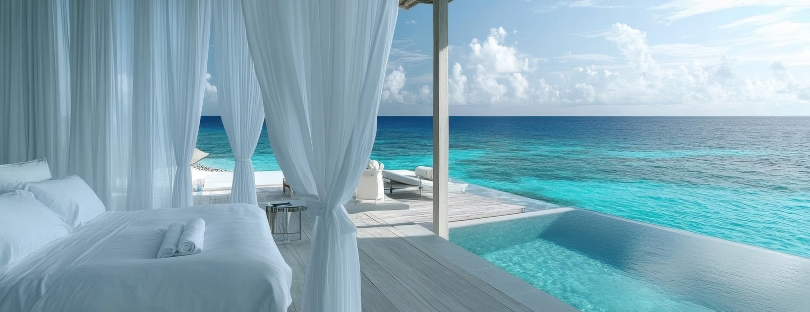
Luxury Hotels Shift to Personalization and Experiential Stays
High-end travelers aren’t just booking plush suites anymore. They want spaces that feel personally tailored to them—from curated local experiences and wellness-first amenities to smart-room setups that remember their lighting preferences and the exact pillow type they like. Luxury hotels are responding by upgrading far beyond the traditional definition of “premium.” The new gold standard? Precision personalization powered by AI, deep loyalty insights, and mobile-first guest journeys. luxury hotel market
According to a new report by Allied Market Research, the global luxury hotel market, valued at $113.1 billion in 2024, is expected to surge to $181.5 billion by 2034—growing at a steady 4.9% CAGR. But the real story isn’t just the numbers; it’s the shift in traveler expectations and how the industry is reshaping itself to meet them.
The New Luxury: Personalization Without Pretense
Luxury brands have spent decades perfecting marble lobbies and Michelin-starred restaurants. Today, those are baseline expectations. What affluent travelers want now is contextual, seamless, tech-enabled service.
Think room environments that auto-adjust based on profile data. Dining suggestions curated to past preferences. Spa treatments are are pre-booked because your app knows your schedule. Some hotels are even crafting AI-built itineraries that sync with weather patterns, local events, and the traveler’s mood or wellness goals.
And it makes sense. When someone pays top-tier prices, the experience shouldn’t be “one size fits all.” Leading chains such as Marriott, Hilton, and Hyatt have invested heavily in these systems, leaning on loyalty programs as massive data engines rather than just points-based perks.
The report highlights this as a major driver for the next decade: luxury is moving from aesthetic to algorithmic.
Bleisure Travel Is Redefining Hotel Economics
One of the strongest growth determinants in the new report is the rise of bleisure—the marriage of business and leisure. Remote and hybrid work have shifted corporate travel patterns dramatically. A business trip no longer ends when the conference does; travelers are extending stays, bringing partners or families, and seeking out relaxation options once the laptop closes.
For luxury hotels, this is a dream scenario. Bleisure travelers book premium rooms, spend more on onsite dining, use spa services, and appreciate business-friendly amenities like high-speed connectivity and private meeting spaces. They also tend to stay longer and have higher per-guest spend.
This shift is already influencing weekday occupancy rates—a traditional challenge for leisure-focused properties. Now, hotels that can seamlessly blend productivity and pleasure are winning.
Experiential Micro-Destinations: The New Status Symbol
Another compelling trend: affluent travelers are chasing micro-destinations instead of classic “luxury hubs.” Rather than the expected Paris or Dubai stay, they’re choosing private islands, mountain retreats, desert lodges, and heritage villages far off the typical tourist map.
These properties offer something urban luxury hotels can’t: disconnection with intentionality.
Seclusion. Cultural immersion. Zero crowds. Hyper-personalized experiences. Think of a foraging tour with a local chef, a guided meditation on a cliffside, or a private astronomy session in the desert. These are the moments travelers photograph, post, and remember.
For luxury operators, micro-destinations present a lucrative chance to diversify portfolios, reduce reliance on saturated urban markets, and raise nightly rates thanks to exclusivity. Luxury Hotels Personalization Experiential Stays
Market Segments: Who’s Leading and Why
Allied’s report breaks market performance down by type and category—and some clear winners emerge.
Business hotels currently dominate with more than one-fourth of the global share. Demand is rising again in financial and tech-heavy cities as corporate travel rebounds. Executive-focused amenities—fast check-in, reliable connectivity, and conference spaces—keep this segment resilient even when leisure softens.
Chain hotels hold more than half of the global luxury market, driven by consistency, extensive loyalty ecosystems, and deep pockets for innovation. Their ability to scale sustainable practices, deploy AI tools, and train staff globally keeps them ahead of independent operators.
North America maintains the largest regional share—nearly one-third of 2024 revenue. The region’s mix of high spending power, robust tourism, and strong corporate travel keeps the market steady. Cities like New York and Los Angeles remain cornerstones, while smaller upscale destinations like Nashville, Austin, and Scottsdale are rising fast.
What’s Holding the Market Back?
No sector grows without obstacles. The report notes two major restraints:
• Geopolitical instability affecting tourist flows in Europe, the Middle East, and parts of Asia
• Heavy reliance on international travelers, which becomes risky when external shocks—pandemics, conflict, economic uncertainty—disrupt cross-border movement
This is precisely why some hotel groups are doubling down on domestic luxury staycations and the remote-work travel crowd. Diversification isn’t just smart; it’s protective.
How Today’s Luxury Strategies Compare With Others in the Market
The trends highlighted in Allied’s report map closely with what other industry trackers like Skift, STR, and McKinsey have been flagging for over a year: personalization and experiential design are the two non-negotiables for the next decade of hospitality.
But not every player is moving at the same speed.
• Marriott and Hyatt are leading the charge in AI-driven service personalization.
• Four Seasons and Aman dominate the experiential micro-destination segment with curated, low-density retreats.
• Accor and IHG are pouring investment into lifestyle brands that blend boutique aesthetics with chain-level consistency.
• Independent luxury hotels excel in authenticity but are often slower to adopt large-scale tech upgrades due to limited budgets.
The winners in the coming decade will be those who merge tech-powered intelligence with human warmth—without losing the cultural or local character that travelers crave.
Conclusion: Luxury Is Becoming Less About Things, More About Thoughtfulness
The global luxury hotel market is not just expanding; it’s transforming. And that transformation is being shaped by a new kind of traveler—one who values personalization over prestige, experiences over extravagance, and meaningful connection over generic luxury.
What makes this moment particularly interesting is that the demand for high-end travel isn’t slowing down; it’s evolving. Brands that see luxury as a static concept are the ones lagging. The ones winning are those building flexible ecosystems that adapt to traveler behavior, not the other way around.
Reliable industry sources—from McKinsey’s travel insights to STR’s performance data and Deloitte’s consumer behavior studies—point to the same conclusion: the most successful luxury hotels of 2034 won’t be the ones with the most marble but the ones with the smartest, most intuitive guest journeys. Luxury Hotels Personalization Experiential Stays
Luxury is no longer defined by how a hotel looks—but by how deeply it understands the person sleeping in the room.









